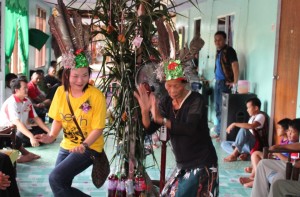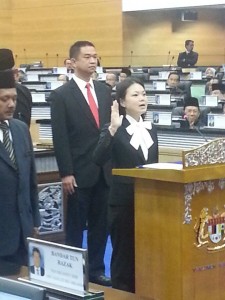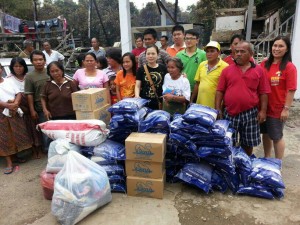NAME: Alice Lau Kiong Yieng
AGE: 32 Years
EDUCATION: International Medical University, Kuala Lumpur, and, University of Strathclyde, Glasgow, Scotland (Master of Pharmacy)
POSITION: Assistant Organising Secretary, Bukit Assek DAP branch Secretary
The 13th GE has finally saw the political tsunami took on a national scale, crossing the sea and shaking the BN’s fixed deposit of Sarawak. DAP won a record-high five parliamentary seats in that state and presented the first opposition woman member of parliament for Sarawak. Lanang MP Alice Lau Kiong Yieng tells us some of the challenges as a first time YB and some of matters she will be looking to fight for the Land of Hornbill. Story by Roketkini. Photo by Wira Andika. Translated by T.K Tan
What would your focus be for your constituency, especially the natives?
My priority now is to fight and obtain basic infrastructure for the Ibans especially those in the longhouses. Many of the Ibans in my constituency lack such basic amenities as electricity and water supply and roads.
In fact, these basic amenities are lacking not just for the Ibans but for many of my other constituents as well.
Another matter which I would be focusing is to improve the poor education standards for the students in my area. This is particularly acute for the natives, who are poor and lack access to adequate education facilities.
In addition, I will be looking highlighting the issue of rural area development and women welfare as a whole for Sarawak. My mission is to hasten hard-core poverty eradication. The welfare aid disbursed by the federal government is pathetically inadequate and the welfare net also needs to be extended. Sarawakians deserve better.
What would you be highlighting and fighting for in the parliament?
Some of the things I am going to look at in specifics are to find out about the actual project allocations that were approved for Lanang. The previous MP had often said that government had given out a lot of funds for the area and that 90 percent of the water and electricity supply has been supplied in the area. However, from my observation for almost 18 years the concerned community has not had electricity supply at all.
It was after DAP won the Dudong state seat (which lies in the Lanang parliamentary area) during the last state election and our particular highlight of an area in Sungai Pak (refer August 2012 edition of The Rocket) that some of the residents there have begun to receive electricity supply and proper roads.
Adding to that is another good example of how the people has benefitted from more opposition presence in the DUN and parliament. Before the state elections in 2011, it was quite difficult for the natives to obtain welfare aid for the poor.
Now after the state elections, there is visibly more project allocations for the native areas.
This proves that BN is actually afraid of the increase in the opposition voices in parliament and state assembly as this would mean more work to be done for them.
Even though there have been some changes, Sarawak as a whole still supports BN. What are the reasons for that?
It cannot be denied that BN’s 1Malaysia People Assistance (BR1M) has had a significant effect on Sarawakians’ voting choice, especially for the natives. The Ibans in my area feels that only BN is able to provide for their needs as it has been in power in Sarawak for more than 40 years. For many of them, if BN collapses the government also collapses!
This is a problem as many of them don’t understand that BN can be voted out of power and the government will still function. Many actually believe that without BN, they wouldn’t get anything!
Is the lack of political education the cause for this blind support for BN?
This is undeniably so. Why are so many natives still living in poverty nowadays? It isn’t too far-fetched to say that BN keeps the natives in dire conditions in other to ensure the natives are still dependent on BN for support. This is how they (BN) have been manipulating the natives’ support all these years.
How was it like campaigning during the GE? Were there restrictions in the rural areas during the campaign period?
We managed to visit almost all the longhouses except for a few longhouses in Dudong as the residents there were worried if our presence there would affect their project allocation from BN. In a particular area, the residents were promised brick houses by BN; they feared that with us visiting them it would jeopardise their prospects of getting the brick house project. We were not allowed to enter there. It was some problem for us
What was the support level from the different segments?
As our internal analysis shows we had overwhelming support from the Chinese community in Lanang. However we suffered a decline in support from the native community. This is due partly to BN’s change of tactics.
One of it was how BN has altered the way it brands its handouts to the natives, which can be quite influential in the native community. An example is the usage of BN’s logo on the water projects given to the natives. My opponent had wisely used the 1Malaysia logo instead of the usual BN symbol on the project signage.
They (the BN strategists) were afraid of using the BN logo as many of the natives in my area had rejected BN. In their mind if they see the BN logo, they would associate it with Taib Mahmud, Sarawak’s chief minister, whom they disdained.
However for them, if the 1Malaysia logo is prominent it assuages them that it’s not from Taib and they would support it. They don’t realise it’s the same party who is doing it.
What was the results breakdown for Lanang in this GE compare with 2011 Sarawak state election?
Overall the voting percentage from the native community declined for DAP as compare to the state elections. In the 2011 state elections, DAP obtained 35 percent while we only took in 28 percent in the 13th general elections on the Dudong area. However overall the native votes for DAP did increase as the voting turnout also increased as well.
Were the rural and interior communities influenced adversely towards DAP during the elections?
There were reports that BN had coerced them. An example was regarding some of the buntings we hung in the longhouse areas. Many of the village chiefs told me they were warned if any opposition buntings were hung in their areas, they would not be given project allocations and some were even told their allowances would be cut.
For many of Sarawak’s natives, elections are a time for them to obtain handouts and cash. It has become an unspoken culture in Sarawak and it is difficult for us to overcome this mindset that has been inculcated by BN for decades.
Are the natives receptive to DAP in Lanang now that it has been won by DAP?
I estimate that it’s a 50-50 divide, some are positive about this result while other are disappointed. Some of them are angry with DAP winning the seat because they believe that we will stop the project allocations for them.
The previous MP, who was my opponent in the GE, had through the Minor Rural Project (MRP) often allocated RM 500 to each household when something disaster happens to them. Recently there was a fire accident in one of the longhouses. As we don’t have access to the MRP funds, I went around collecting donations to help them.
In that particular instance we donated 50 bags of rice to one of the longhouses. The residents asked if we could also provide dishes (sardines, canned food etc) to go with the rice donation. In their mindset many of them believed that since I am the MP I should provide more.
These are some of the obstacles I faced as the natives expect us that we as the elected representative are supposed to help them financially as well.
What about recruiting native members into DAP?
I am all for it. DAP is not a racial-based party or upholds only a certain race. The fact is Malaysia is a multi-racial and multi-cultural country. We have to give attention to all races. In order to transgress the racial and cultural thinking barriers that has been poisoned by BN for so many decades, DAP needs all the races to join and participate in it, whether Malays, Indians, Ibans or any other ethnic groups a DAP is for all Malaysians.
What would your main challenge be in serving the constituency?
Sarawak is a big state. The Lanang parliamentary seat is vast; it is several times the size of Singapore. It is a bit of challenge for me as woman to enter into every village with the bad road conditions and lack of basic amenities such as street lights like Peninsular Malaysia
I will need to go early in the day to visit any longhouses or village. However in spite of these challenges, I will strive to do my best as I believe the people deserved a better government.
What about women’s acceptance for DAP and you? What would you say to the women throughout the country?
On the whole I have to say the women are more supportive of DAP as Sibu has never had a woman candidate before and I am the first woman opposition MP for Sarawak. Here, the womenfolk are able to accept me easier compare to the men.
Women throughout Malaysia need to inculcate the mindset that politics is not just men’s expertise only; women also need to participate and fight for all Malaysians’ rights
Politics is a question of responsibility to the people and it’s not exclusive to men only. In order for Malaysia to move forward, we have to a balance of men and women in politics for a better future for Malaysia.









Pingback: Interview: Alice Lau | PR
How can I contact you YB Alice Lau Kiong Yieng. After reading your interview, I feel that I can help. Why don’t you teach them to fish? I think we can make something out with proper planing. I am quite familiar with the geographical layout and custom of your Parlimentary ara.